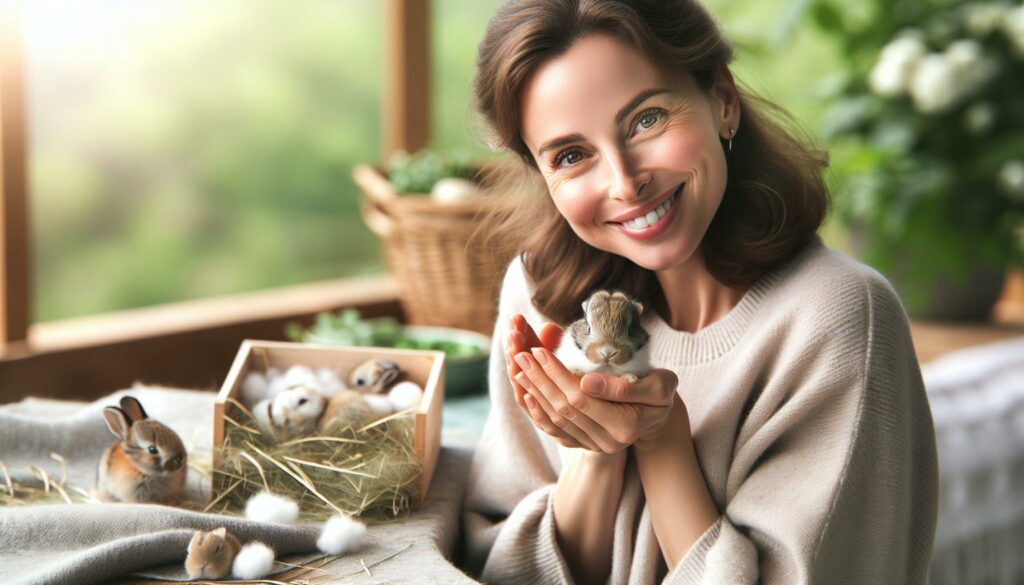Caring for newborn rabbits is a rewarding but delicate responsibility. These tiny creatures, often called kits, require special attention to thrive in their early days. As a rabbit enthusiast, I’ve learned that understanding their unique needs can make all the difference in ensuring their health and happiness.
From proper feeding techniques to creating a safe environment, every aspect of newborn rabbit care is crucial. With the right approach, you can help these adorable bundles of fur grow into healthy adult rabbits. Let’s dive into the essentials of newborn rabbit care and discover how to nurture these fragile little ones effectively.
Key Takeaways
- Newborn Rabbit Care: Understanding the specialized needs of newborn rabbits, or kits, is essential for their health and survival in the early weeks of life.
- Feeding Essentials: Kits should nurse from their mother for crucial nutrients; if she is unavailable, use specially formulated rabbit milk replacers, avoiding cow’s milk entirely.
- Safe Environment: Create a warm and quiet nesting area using soft bedding materials, like fleece or hay, and ensure consistent temperature control to prevent chilling.
- Health Monitoring: Regularly check kits for weight gain, hygiene, and possible signs of health issues that may require veterinary attention, such as unusual behavior or weight loss.
- Essential Supplies: Equip yourself with necessary items, including nesting materials, commercial milk replacers, and feeding bottles, to support the care and comfort of newborn rabbits.
- Timely Intervention: Be vigilant about health considerations and consulting a veterinarian promptly whenever signs of distress or illness appear in kits.
Newborn Rabbit Care
Caring for newborn rabbits, or kits, requires special attention and knowledge. Kits rely on their mother for nutrition, warmth, and safety during their first few weeks of life. It’s crucial to monitor the mother rabbit for signs of health issues, as her well-being directly affects her babies.
Proper Feeding Techniques
Feeding newborn rabbits involves providing them with their mother’s milk, which contains vital nutrients. Kits typically nurse several times a day. If the mother isn’t present or unable to nurse, a commercial milk replacer designed for rabbits offers an alternative. Here are essential points regarding feeding:
- Mother’s Milk: Kits gain all necessary nutrients from their mother’s milk within the first few weeks.
- Milk Replacers: Only use products specifically formulated for rabbits if the mother isn’t available.
- Feeding Frequency: Young rabbits nurse approximately every 1-2 hours during their initial days.
Creating a Safe Environment
Establishing a safe space is critical for newborn rabbits. A warm, quiet area ensures comfort and reduces stress. Consider these factors for their environment:
- Nesting Box: Use a nesting box filled with soft bedding to keep the kits secure and warm.
- Temperature Control: Maintain a consistent, warm temperature to prevent chilling, especially in the first two weeks.
- Limited Handling: Avoid excessive handling, as it can induce stress and harm their development.
Health Monitoring
Regular health checks are essential for ensuring the well-being of newborn rabbits. Signs to watch for include:
- Weight Gain: Kits should gain weight daily. Monitor this closely for any signs of inadequate feeding.
- Hygiene: Keep the nesting area clean and dry to prevent infections.
- Physical Condition: Any unusual behavior or physical abnormalities requires prompt veterinary attention.
By focusing on these areas, caregivers can effectively support the growth and health of newborn rabbits. Understanding their unique needs leads to nurturing and protects them as they transition into healthy adult rabbits.
Essential Supplies for Newborn Rabbits
Proper supplies are crucial for ensuring the health and comfort of newborn rabbits. Focusing on specific items can create a nurturing environment for the kits.
Nesting Materials
Quality nesting materials provide warmth and safety for newborn rabbits. I use:
- Soft Hay: Timothy hay is ideal due to its softness and warmth, creating a comfy laying area.
- Fleece Fabric: This material retains heat and allows for easy cleaning, promoting a hygienic environment.
- Cardboard: Sturdy, shredded cardboard can enhance insulation and serve as a chew toy as the kits grow.
- Absorbent Bedding: Products like aspen shavings offer good absorbency, which aids in maintaining a clean nesting area.
Ensure that all materials are clean and free of harmful chemicals. It’s important to replace soiled bedding regularly to keep the nesting area healthy.
Feeding Supplies
Feeding supplies are vital if the mother isn’t available for nursing. Essential items include:
- Commercial Milk Replacer: Formulas designed specifically for rabbits, like Esbilac or KMR, provide balanced nutrition.
- Feeding Bottles: Use small, soft bottles with nipple attachments to mimic nursing for effective feeding.
- Syringes: For emergency feeding, a small syringe can facilitate milk delivery without aspiration risks.
- Heating Pad: A low-heat pad helps maintain body temperature during feeding sessions, maintaining comfort for the kits.
Monitoring the feeding process ensures kits receive adequate nutrition. Properly equipped supplies contribute significantly to the successful care of newborn rabbits.
Feeding Newborn Rabbits
Feeding newborn rabbits requires attention to detail to ensure their proper growth and health. Understanding milk replacement options and a suitable feeding schedule is crucial for successful care.
Milk Replacement Options
When a mother rabbit isn’t available, I rely on high-quality commercial milk replacers designed for rabbits. These formulas mimic the nutritional profile of mother’s milk, providing essential proteins, fats, and vitamins. While goat’s milk can serve as a temporary substitute, it’s not as balanced as commercial options. Always avoid cow’s milk, as its composition doesn’t meet the needs of kits. Ensure the milk replacer is fresh and prepared according to the instructions, as this maximizes its effectiveness in supporting healthy development.
Feeding Schedule and Technique
Establishing a consistent feeding schedule helps newborn rabbits thrive. I typically feed kits every 2-3 hours during their first week of life, gradually increasing the interval to 4-6 hours as they approach two weeks. For optimal results, I use a small syringe or a specially designed feeding bottle to deliver the milk replacer. It’s essential to hold the kit upright during feeding to encourage proper swallowing and digestion. Always observe the kit’s weight and body condition, adjusting feeding frequency and amounts as necessary to promote healthy growth.
Health Considerations
Caring for newborn rabbits includes vigilant attention to health. Regular monitoring helps catch any health issues early, ensuring kits thrive.
Common Health Issues
Common health issues in newborn rabbits include:
- Hypothermia: Newborns can’t regulate their body temperature well. Maintain their environment at 90°F (32°C) to prevent cold stress.
- Failure to Thrive: Some kits may not gain weight or grow. Check nursing frequency and ensure adequate milk intake to address this.
- Diarrhea: Watery stool indicates digestive problems. Monitor their diet and remove unsuitable foods immediately.
- Respiratory Infections: Signs include sneezing or nasal discharge. Maintain a clean, dry environment to reduce exposure to pathogens.
- Coccidia: This intestinal parasite can plague young rabbits. Regularly check stool for signs of abnormality and manage hygiene carefully.
When to Consult a Veterinarian
Consult a veterinarian under these circumstances:
- Weight Loss: If a kit loses weight despite adequate feeding, seek veterinary advice promptly.
- Extreme Weakness: Any signs of lethargy or difficulty moving warrant immediate attention.
- Unusual Behavior: If kits display unusual lethargy or refusal to nurse, consult a veterinarian.
- Severe Diarrhea: Persistent watery stool or signs of dehydration require professional evaluation.
- Injuries or Physical Abnormalities: Any signs of injury or visible issues, such as swelling, demand veterinary insight.
Taking swift action ensures newborn rabbits remain healthy and develop properly.
Creating an Ideal Environment
Creating an ideal environment for newborn rabbits, or kits, plays a vital role in their development and overall well-being. Focusing on temperature, comfort, and safety ensures that the little ones thrive during their early days.
Temperature and Comfort
Temperature regulation maintains a suitable environment for kits. Newborn rabbits require a warm, stable temperature of approximately 85°F to 90°F. If the mother isn’t present, I suggest utilizing heating pads or heat lamps to maintain warmth, ensuring they don’t overheat. Placing a soft, insulated nesting box lined with materials like soft hay or fleece fabric provides a cozy space. Regularly checking the temperature helps me adjust if necessary, keeping kits comfortable and promoting healthy growth.
Safety Precautions
Safety precautions are crucial in preventing injuries or stress among newborn rabbits. I keep the nesting area free of sharp objects and remove any harmful substances. Limiting handling reduces the risk of stress, as kits are delicate and can easily become overwhelmed. Providing a quiet, low-traffic space minimizes disturbances from other pets or loud noises. Additionally, monitoring the enclosure for escape routes protects the kits from wandering off or getting trapped. Keeping these safety measures in place creates a secure environment for my newborn rabbits to thrive.
Caring for newborn rabbits is a rewarding yet delicate task that requires attention and dedication. By understanding their specific needs and providing the right environment and nutrition, I can help these tiny creatures thrive. Regular health monitoring and a safe, comfortable space are essential for their development.
With the right supplies and a commitment to proper care, I can ensure that my kits grow into healthy and happy adult rabbits. Remember that every small effort I make contributes significantly to their well-being. Embracing this responsibility not only enriches my life but also enhances the lives of these adorable little ones.



